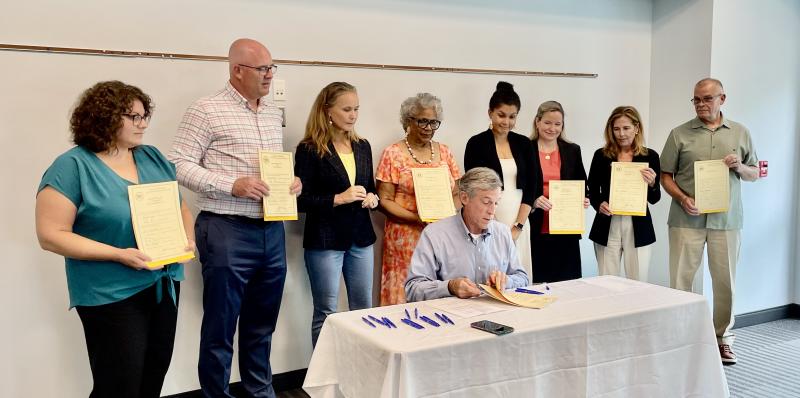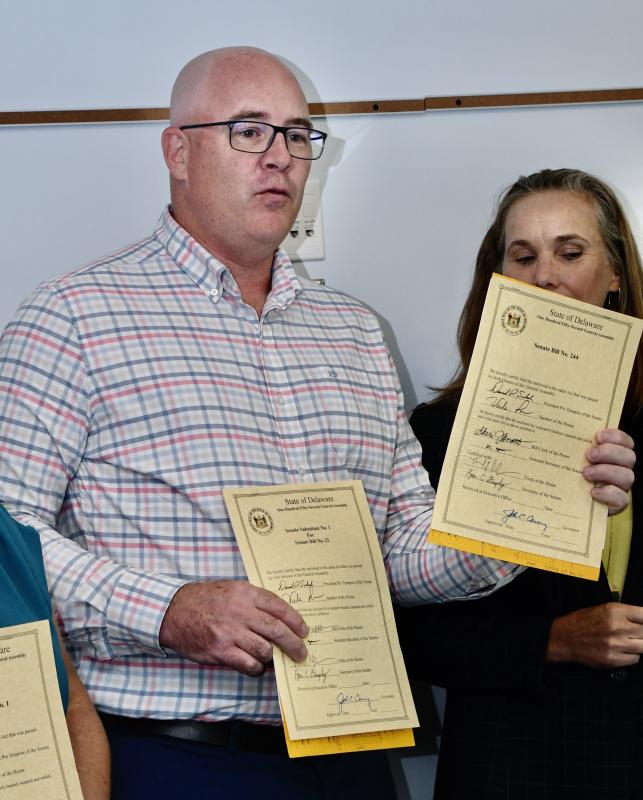Huxtable champions six housing bills

In unprecedented legislative action, Gov. John Carney met with officials Aug. 9, at Lewes library to sign seven bills into law relating to housing needs in the state. Six of the bills were sponsored by Sen. Russ Huxtable, D-Lewes.
The governor and fellow legislators heaped praise on Huxtable for championing the issues of workforce and affordable housing. The bills provide funds for home repairs, foreclosure mediation, incentives for developers building affordable and workforce housing projects, and greater protections for residents living in manufactured housing communities.
Before the historic signing, Carney said there are a lot of challenges to the affordable housing shortage in the state. “It’s a very complicated and expensive issue, but it’s one of our biggest priorities,” he said.
Carney said Huxtable’s experience and leadership pushed the agenda and united members of both houses.
Huxtable, who is serving his first term and is up for re-election, said he and other advocates went on a listening tour all over the state last fall and winter to hear the issues and to understand what legislators could do to assist in the housing crisis.
“Russ brought the momentum to the Senate,” said Senate Majority Whip Elizabeth Lockman, D-Wilmington. “We will continue to work on this issue; we are just getting started.”
Attorney General Kathy Jennings said nothing matters more to people than keeping their house. She said the mortgage mediation program has proved its worth over the years. “It’s been critically important, and the need for mediation is growing,” she said.
One of the bills extends that program by removing its expiration date.
“This program helps people stay in their homes. It’s hard to get hard things done. These legislators here today are knocking it out of the park,” Jennings added.
Huxtable’s background prior to being elected centered around affordable housing. He has more than 18 years’ experience working for Milford Housing Development Corporation, which is dedicated to developing affordable housing in Sussex County and throughout the state. He is a nationally recognized leader in affordable housing who has served on boards and advisory committees, and has spoken at local and national housing conferences.
Senate Substitute 1 for Senate Bill 22
The bill allows for workforce housing investors to be reimbursed through a grant up to 20% of the capital costs associated with workforce housing units they create. Projects must be Levels 1 and 2 of the Delaware Strategy for State Policies and Spending, and grants are not available to projects using federal or state low-income tax credits.
Senate Bill 25
The bill exempts contracts for construction of affordable housing units from 2% of realty transfer tax.
Senate Bill 244
The bill allows counties to spend funding collected from the lodging tax on workforce and affordable housing units.
Senate Substitute 1 for Senate Bill 245
The bill removes the expiration date from the Office of Foreclosure Prevention and Financial Education and the Residential Mortgage Foreclosure Mediation Program.
Under the bill, the notice of intent of foreclosure must include the contact information for the Delaware State Housing Authority foreclosure prevention program and also direct homeowners to U.S. Department of Housing and Urban Development certified housing counselors for assistance.
Senate Bill 246
The bill codifies a housing repair and modification fund administered by the DSHA to serve low- and very-low-income homeowners in need of home repair assistance.
Senate Substitute 1 for Senate Bill 293
The bill repeals the exemption that allows a landlord to discriminate based on the source of income for tenants who participate in government-sponsored rental assistance programs.
The bill also includes outreach to landlords to educate them about how the act changes the law.
Senate Substitute 1 for Senate Bill 247
The bill makes it clearer that owners of manufactured home communities with health and safety violations and conditions that threaten the health and safety of residents cannot continue to raise rents without fixing the conditions and providing for a safe community.
























































